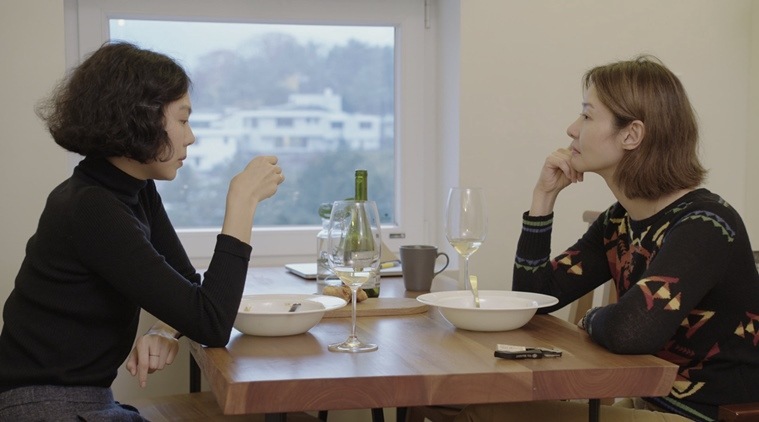 The Woman Who Ran gives us a wonderful look at female lives: what binds them, and what makes them free.
The Woman Who Ran gives us a wonderful look at female lives: what binds them, and what makes them free.
South Korean cinema is not all dystopia and despair. Hong Sangsoo’s delightful The Woman Who Ran focuses on the central character of Gamhee as she arrives on the outskirts of Seoul to meet with old friends, and gives us a wonderful look at female lives: what binds them, and what makes them free.
During the conversation that unfolds during the cooking and eating and chatting (Gamhee’s friend’s flatmate is an ace cook, rustling up some grilled meats for their meal), we discover that Gamhee has been married five years and has never been apart from her husband even for a day. Except on this occasion, when he is away on a business trip, which has set her free to do her own thing.
A visit to a second friend, who is in the middle of some trouble (she is recovering from an accidental tryst with a stranger, who is insisting on becoming more than a one-night stand) takes her into another world altogether. And during a solo cinema visit, she bumps into a third woman, who is married to a man Gamhee used to be involved with.
All three encounters follow one after another. The progression is linear, and each reveals more about Gamhee than her friends, but equally each episode is a delicate dive into their lives. The first friend and her flatmate turn out to be a cat-lovers, and we discover this when a male neighbor shows up complaining about the ‘robber cats’ that the women feed. The way in which he, and his complaints, are brushed aside are symptomatic of Hong’s vision for this film, gently but firmly female-focussed.
The two other men who show up, one demanding attention from a woman who has no desire to give it, and the other, an ex-boyfriend, are all shown with their backs to us. We never see their faces: it is not important that we do; they are not important enough.
It’s a slender wisp of a film, only 77 minutes, and extremely minimalistic in its execution. But the depths that it mines is quite astonishing. At one point, the third woman complains about a TV anchor always repeating himself. How can he be sincere if he is saying the same thing over and over again, she asks. But then Gamhee is doing the repetitive thing herself, by declaring to each friend in our hearing just how her husband of five years decrees that if two people love each other, they must always be together. When one of herself rolls her eyes, you feel like doing the same. Is Gamhee herself sincere? And where is the husband? We never see him. Does he even exist? Or by not being around physically, has Gamhee pushed him to the periphery of her mind?
**
Bad Tales, written and directed by Fabio and Damiano D’Innocenzo, is a startlingly disturbing tale of how people can hurt each other even if they are family. It is summer, and in a row of houses, fathers, mothers and children circle each other, some with wariness, some with dwindling trust, as they deal with each other’s anger, cruelty and frustrations.
The film doesn’t give too many explanations. But as we see a particular father given to violent rages, another who isn’t bothered about his newborn baby, and yet another who is clearly incapable of responsibility, drag his son off into what promises to be a downward spiral, we understand what the film is getting at. Parenthood is not everyone’s ideal, and the idea of being a man is a complex thing. Thwarted expectations can turn people into monsters, and it is the children who are the most impacted.
The last twenty minutes gathers all these strands into a shocking, tragic end. You want to get angry with these men, who have forced such unhappiness on their close ones. And then you ask yourself: how did they grow up themselves? Did they have any food on the table, or were they also fed on scraps and leftovers, just like one father does? He works as a server in a restaurant, and his idea of a meal for himself and his young boy, is leftover pizza. Day after day. Is this any kind of life? Even death may be better.
Express at Berlinale 2020 Day 5 | Day 4 | Day 3 | Day 2 | Day 1
**
Postscript: A star turn is sometimes all a film needs to make itself memorable. I catch Minamata, starring Johnny Depp as a washed-out, swirling-in-booze once-great-photographer, on the first day of the festival. Based on the real-life story of a celebrated photographer who allows himself to be persuaded to document evidence of a greedy, powerful corporation in Japan which contaminating the environment by untreated chemicals, Minamata, directed by Andrew Levitas, is not a particularly good film. It goes about its intentions loudly, even as we see the harrowing result on humans—limb deformity, deep disability. But Depp gets deep in character, and pulls off a performance, predictable beats and all, which will stay. It is growly, gravelly, more than a little showy, and yet oddly redemptive.